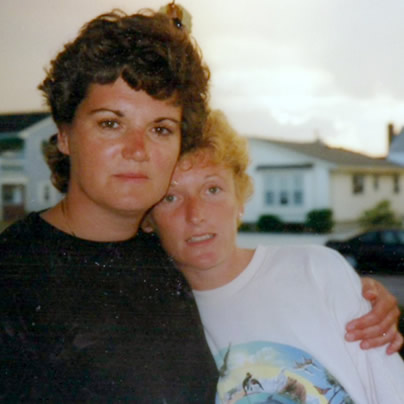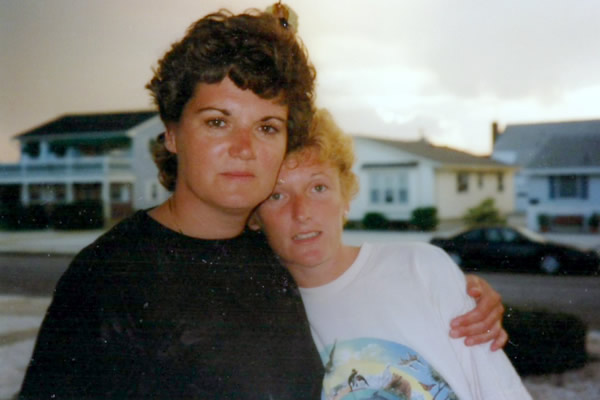National
ACLU unveils trio of post-DOMA marriage lawsuits
Plans announced for litigation in Pennsylvania, North Carolina and Virginia


Maureen Hennessey (right) with her late spouse Mary Beth is a widow plaintiff in a Pennsylvania lawsuit seeking marriage equality (Photo courtesy of ACLU Pennsylvania).
For lesbian widow Maureen Hennessey, winning same-sex marriage in Pennsylvania isn’t just about obtaining Social Security and tax benefits, but the dignity of having her relationship with her late partner of 29 years recognized by her state.
“There are some financial changes that legalizing marriage in Pennsylvania would bring about, but even just the whole respect and relationship being validated, that’s the whole part of it,” Hennessey said. “That’s what really would make a difference.”
Hennessey, 53, is one of 11 plaintiff couples in a federal lawsuit that the American Civil Liberties Union was set to file on Tuesday asking the U.S. District Court for the Middle District of Pennsylvania to overturn the Keystone State’s statutory ban on same-sex marriage. The complaint can be found here.
Building off the win at the U.S. Supreme Court in the case it filed against the Defense of Marriage Act on behalf of lesbian widow Edith Windsor, the ACLU is filing the Pennsylvania lawsuit as part of a group of three new lawsuits that seek to advance marriage equality in different parts of the country.
In addition to the Pennsylvania lawsuit, named Whitewood v. Corbett, the ACLU is also undertaking cases seeking marriage equality in North Carolina and Virginia.
The North Carolina lawsuit is amending the complaint in the case of Fisher-Borne v. Smith, a lawsuit on behalf of six plaintiff couples who previously sought second-parent adoption rights. The ACLU was also set to amend its lawsuit in the North Carolina case on Tuesday, although a copy of the complaint wasn’t immediately available.

Marcie and Chantelle Fisher-Borne (Photo courtesy of the ACLU)
Chantelle Fisher-Borne, a 38-year-old non-profit consultant and one-half of the lead plaintiff couple in the case, said there are many reasons why she wants her union to her partner of 15 years recognized as a marriage in North Carolina, which just last year passed a constitutional ban on same-sex marriage.
“Some of them involve benefits such as health insurance, or the same issues we have around the parenting things we have with our children, being able to really have the legal recognition we have in our hearts as a married couple,” Fisher-Borne said. “It provides a kind of safety that most couples and parents want and many have but we don’t.”
In Virginia, the lawsuit is still in its planning phases — no plaintiffs have yet been chosen for the case — although the ACLU anticipates filing it later this summer.
James Esseks, director of the American Civil Liberties Union’s LGBT Project, said his organization is filing the lawsuits to add its voice to the seven lawsuits already pending in federal court seeking a nationwide ruling in favor of marriage equality.
“We are adding our voices to those cases in bringing plaintiffs with compelling stories with decades of commitment and the ways in which they’re harmed by not being able to marry,” Esseks said. “And we’re hoping to bring their stories both to the American public and to courts that have a good shot at giving the issues a fair hearing.”
The Pennsylvania lawsuit, which challenges the state’s ban on same-sex marriage on the basis that it violates plaintiffs’ due process and equal protection rights under the Fourteenth Amendment, emphasizes the loss of benefits for the couples and their children.
The 52-page complaint in the Pennsylvania case also draws on the Supreme Court’s decision in United States v. Windsor as legal precedent for why the federal court should strike down state’s ban on same-sex marriage.
“The fact that a discriminatory law is long-standing does not immunize it from constitutional scrutiny,” the complaint states. “And the Supreme Court has made clear that the law cannot, directly or indirectly, give effect to private biases and has expressly rejected moral disapproval of marriage for same-sex couples as a legitimate basis for discriminatory treatment of lesbian and gay couples.”
The plaintiff couples can be broken down into two categories. Six are seeking the right to marry in Pennsylvania, including Deb and Susan Whitewood, who gave their names to the lawsuit. Five other couples — like Hennessey, who lost her spouse Mary Beth McIntyre to lung cancer after having wed in Massachusetts — are looking to have their legal marriages recognized in Pennsylvania.
The couples include lawyers, a truck driver, a doctor, veterans, a stay-at-home mom and retirees. One couple is represented in the lawsuit by their children who are still minors and designated as A.W. and K.W.
Hennessey, who had three children with McIntyre and is expecting a fourth grandchild soon, said she’s particularly seeking Social Security survivor benefits, which are still in question after the DOMA ruling because she lives in state that doesn’t recognize same-sex marriage.
“I’m 53 years old, and Mary Beth was the primary bread-winner in the family,” Hennessey said. “So, her Social Security would be way higher than mine, unless I win the lottery.”
For Marcie Fisher-Bourne, who works for the American Cancer Society, the need for the legal recognition of her union became particularly salient on the day she gave birth to her daughter five years ago. The couple encountered problems even though they were legally married in D.C.
“When I transferred to the unit for recovery at one in the morning, the nurse looks at Chantelle and says, ‘Why is she here? Where is her paperwork?’ Marcie Fisher-Bourne said. “So when you ask, why will it matter here in North Carolina, to me, that’s a really good example. On that day, on the day that our daughter was born, I would not have had to fish through my emergency suitcase to find health care power of attorney papers so my spouse could be beside me when our first child was born. So, yes, it matters.”
And there’s optimism in the air plaintiffs will able to win marriage equality, particularly in the wake of the Supreme Court’s decision finding DOMA unconstitutional. Hennessey predicted the lawsuit is “definitely going to succeed.”
“I don’t think it’ll happen overnight, but I know that the legislators in Harrisburg are probably want to drag their feet as much as possible,” she said. “But we’re going to push it forward, and I think that the people, I think that the population is ready to accept same-sex marriages, and I think that it will happen.”

The Comings & Goings column is about sharing the professional successes of our community. We want to recognize those landing new jobs, new clients for their business, joining boards of organizations and other achievements. Please share your successes with us at [email protected].
Congratulations to Gil Pontes III on his recent appointment to the Financial Advisory Board for the City of Wilton Manors, Fla. Upon being appointed he said, “I’m honored to join the Financial Advisory Board for the City of Wilton Manors at such an important moment for our community. In my role as Executive Director of the NextGen Chamber of Commerce, I spend much of my time focused on economic growth, fiscal sustainability, and the long-term competitiveness of emerging business leaders. I look forward to bringing that perspective to Wilton Manors — helping ensure responsible stewardship of public resources while supporting a vibrant, inclusive local economy.”
Pontes is a nonprofit executive with years of development, operations, budget, management, and strategic planning experience in 501(c)(3), 501(c)(4), and political organizations. Pontes is currently executive director of NextGen, Chamber of Commerce. NextGen Chamber’s mission is to “empower emerging business leaders by generating insights, encouraging engagement, and nurturing leadership development to shape the future economy.” Prior to that he served as managing director of The Nora Project, and director of development also at The Nora Project. He has held a number of other positions including Major Gifts Officer, Thundermist Health Center, and has worked in both real estate and banking including as Business Solutions Adviser, Ironwood Financial. For three years he was a Selectman, Town of Berkley, Mass. In that role, he managed HR and general governance for town government. There were 200+ staff and 6,500 constituents. He balanced a $20,000,000 budget annually, established an Economic Development Committee, and hired the first town administrator.
Pontes earned his bachelor’s degree in political science from the University of Massachusetts, Dartmouth.
Kansas
ACLU sues Kansas over law invalidating trans residents’ IDs
A new Kansas bill requires transgender residents to have their driver’s licenses reflect their sex assigned at birth, invalidating current licenses.

Transgender people across Kansas received letters in the mail on Wednesday demanding the immediate surrender of their driver’s licenses following passage of one of the harshest transgender bathroom bans in the nation. Now the American Civil Liberties Union is filing a lawsuit to block the ban and protect transgender residents from what advocates describe as “sweeping” and “punitive” consequences.
Independent journalist Erin Reed broke the story Wednesday after lawmakers approved House Substitute for Senate Bill 244. In her reporting, Reed included a photo of the letter sent to transgender Kansans, requiring them to obtain a driver’s license that reflects their sex assigned at birth rather than the gender with which they identify.
According to the reporting, transgender Kansans must surrender their driver’s licenses and that their current credentials — regardless of expiration date — will be considered invalid upon the law’s publication. The move effectively nullifies previously issued identification documents, creating immediate uncertainty for those impacted.
House Substitute for Senate Bill 244 also stipulates that any transgender person caught driving without a valid license could face a class B misdemeanor, punishable by up to six months in jail and a $1,000 fine. That potential penalty adds a criminal dimension to what began as an administrative action. It also compounds the legal risks for transgender Kansans, as the state already requires county jails to house inmates according to sex assigned at birth — a policy that advocates say can place transgender detainees at heightened risk.
Beyond identification issues, SB 244 not only bans transgender people from using restrooms that match their gender identity in government buildings — including libraries, courthouses, state parks, hospitals, and interstate rest stops — with the possibility for criminal penalties, but also allows for what critics have described as a “bathroom bounty hunter” provision. The measure permits anyone who encounters a transgender person in a restroom — including potentially in private businesses — to sue them for large sums of money, dramatically expanding the scope of enforcement beyond government authorities.
The lawsuit challenging SB 244 was filed today in the District Court of Douglas County on behalf of anonymous plaintiffs Daniel Doe and Matthew Moe by the American Civil Liberties Union, the ACLU of Kansas, and Ballard Spahr LLP. The complaint argues that SB 244 violates the Kansas Constitution’s protections for personal autonomy, privacy, equality under the law, due process, and freedom of speech.
Additionally, the American Civil Liberties Union filed a temporary restraining order on behalf of the anonymous plaintiffs, arguing that the order — followed by a temporary injunction — is necessary to prevent the “irreparable harm” that would result from SB 244.
State Rep. Abi Boatman, a Wichita Democrat and the only transgender member of the Kansas Legislature, told the Kansas City Star on Wednesday that “persecution is the point.”
“This legislation is a direct attack on the dignity and humanity of transgender Kansans,” said Monica Bennett, legal director of the ACLU of Kansas. “It undermines our state’s strong constitutional protections against government overreach and persecution.”
“SB 244 is a cruel and craven threat to public safety all in the name of fostering fear, division, and paranoia,” said Harper Seldin, senior staff attorney for the ACLU’s LGBTQ & HIV Rights Project. “The invalidation of state-issued IDs threatens to out transgender people against their will every time they apply for a job, rent an apartment, or interact with police. Taken as a whole, SB 244 is a transparent attempt to deny transgender people autonomy over their own identities and push them out of public life altogether.”
“SB 244 presents a state-sanctioned attack on transgender people aimed at silencing, dehumanizing, and alienating Kansans whose gender identity does not conform to the state legislature’s preferences,” said Heather St. Clair, a Ballard Spahr litigator working on the case. “Ballard Spahr is committed to standing with the ACLU and the plaintiffs in fighting on behalf of transgender Kansans for a remedy against the injustices presented by SB 244, and is dedicated to protecting the constitutional rights jeopardized by this new law.”
National
After layoffs at Advocate, parent company acquires ‘Them’ from Conde Nast
Top editorial staff let go last week

Former staff members at the Advocate and Out magazines revealed that parent company Equalpride laid off a number of employees late last week.
Those let go included Advocate editor-in-chief Alex Cooper, Pride.com editor-in-chief Rachel Shatto, brand partnerships manager Erin Manley, community editor Marie-Adélina de la Ferriére, and Out magazine staff writers Moises Mendez and Bernardo Sim, according to a report in Hollywood Reporter.
Cooper, who joined the company in 2021, posted to social media that, “Few people have had the privilege of leading this legendary LGBTQ+ news outlet, and I’m deeply honored to have been one of them. To my team: thank you for the last four years. You’ve been the best. For those also affected today, please let me know how I can support you.”
The Advocate’s PR firm when reached by the Blade said it no longer represents the company. Emails to the Advocate went unanswered.
Equalpride on Friday announced it acquired “Them,” a digital LGBTQ outlet founded in 2017 by Conde Nast.
“Equalpride exists to elevate, celebrate and protect LGBTQ+ storytelling at scale,” Equalpride CEO Mark Berryhill said according to Hollywood Reporter. “By combining the strengths of our brands with this respected digital platform, we’re creating a unified ecosystem that delivers even more impact for our audiences, advertisers, and community partners.”
It’s not clear if “Them” staff would take over editorial responsibilities for the Advocate and Out.


















